With climate change and increased concerns about our environment, more consumers are concerned with finding a bank that does more good than bad. That can be a difficult task since a lot of banks, namely large national ones, invest in fossil fuels.
Banks and credit unions that invest more time and resources into the communities they serve can also be considered more socially responsible.
We’ve identified the best socially responsible banks based on factors like their efforts to minimize emissions, better the welfare of society, and make ethical choices.
9 Best Socially Responsible Banks and Credit Unions
Let’s take a look at the best socially responsible banks and credit unions out there today.
We’ve ranked these institutions based on a combination of their certifications, social initiatives, and products oriented toward making an impact.
- City First Bank
- GreenFi (formerly Aspiration)
- Clearwater Credit Union
- Amalgamated Bank
- Beneficial State Bank
- Spring Bank
- Mascoma Bank
- Sunrise Bank
- U.S. Bank
1. City First Bank 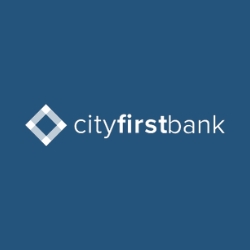
- CERTIFICATION: B-Corp, CDFI, GABV
- PERKS: credit card, bill pay, 24-hour phone banking
- AVAILABILITY: local branches in Washington DC or online
City First Bank is certified by GABV, B-Corp, and CDFI. This bank focuses on improving the lives of underrepresented communities in Washington, D.C.
With $1 billion in assets, the bank is committed to providing members of underfunded communities with the same opportunities as anyone else.
The bank is also among B Corp’s Best for the World, meaning it’s in the organization’s top 5% of socially responsible corporations.
City First Bank offers checking, savings, cash management accounts, and lending services. It comes with features like online and mobile banking, 24-hour telephone banking, bill pay, and a complimentary debit card.
While City First Bank is a local community bank, it can be compared with pride to its larger counterparts.
2. GreenFi (formerly Aspiration) 
- CERTIFICATION: B-Corp
- PERKS: cashback and APY
- AVAILABILITY: online-only
GreenFi (formerly Aspiration) is a respected online-only bank that’s been designated as one of B Corp’s Best for the World.
The bank donates a generous 10% of its yearly profits to charity. On top of that, you can be sure that your money won’t end up supporting fossil fuel projects such as oil drilling and coal mines.
Their card is made exclusively from plastic recycled from the ocean. GreenFi also allows you to plant a tree with every purchase with their “Plant Your Change” service.
GreenFi has several financial products, offering cashback rewards opportunities if you buy from selected vendors from the Conscience Coalition, such as TOMS, Warby Parker, and Blue Apron.
GreenFi has an interest-bearing account called the Plus Account, which earns an increased 3.00% APY, and up to 6% cashback.
3. Clearwater Credit Union 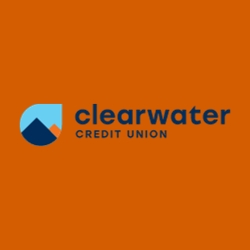
- CERTIFICATION: GABV, CDFI, Inclusive
- PERKS: financial planning, no fees
- AVAILABILITY: Montana/online
Clearwater Credit Union has three certifications. In addition to being a GABV and CDFI member, it’s also a part of Inclusiv, a network of credit unions allied to support low-income families nationwide in reaching financial independence.
Clearwater also supports causes like reducing carbon footprints, protecting the environment, and granting equal pay.
To join this credit union, you usually have to be a Montana resident. However, it’s also possible to become a member by supporting a poverty alleviation association partnered with Clearwater.
Clearwater offers a free membership with useful financial planning tools, and it’s easy to apply for accounts online.
It has an interest-bearing checking account, savings accounts, MMAs, and CDs, as well as loans and business banking products.
Learn More at Clearwater Credit Union
4. Amalgamated Bank 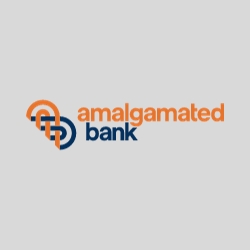
- CERTIFICATION: B-Corp, GABV
- PERKS: secure deposits, Zelle, bill pay
- AVAILABILITY: online and in Washington DC, New York, and California.
Amalgamated Bank – the first bank owned by a credit union – is a certified B-Corp and a GABV member.
The bank has a history of putting human rights first and currently supports several causes, nonprofits, and social enterprises.
Some of the causes supported by Amalgamated Bank are climate change, immigrant rights, workers’ rights, criminal justice, gun safety, LGBTQ+ rights, and voting rights.
Amalgamated Bank is an FDIC member and an Equal Housing and Equal Opportunity Lender.
This bank offers personal and business banking, with a range of checking and savings accounts. You can also take advantage of investment services, including fossil fuel-free portfolios.
Learn More at Amalgamated Bank
5. Beneficial State Bank 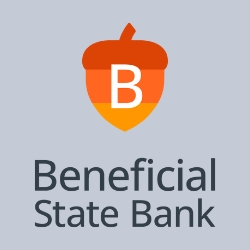
- CERTIFICATION: B-Corp, CDFI, GABV
- PERKS: video banking, a variety of financial products
- AVAILABILITY: online and local branches in OR, CA e WA
Beneficial State Bank has been triple-certified by B-Corp, CDFI, and GABV.
Its efforts aim to support businesses owned by minorities, green structures and services, and sustainable practices.
This bank has around $1.5 billion in assets and has decided to support good causes and corporate social responsibility programs. Namely, it focuses on mission-impact sectors like arts and culture, social justice, affordable housing, and healthy foods.
Opening a bank account online with Beneficial State Bank is easy. You can do it online or with the mobile app.
Its financial offerings include credit cards, loans, and personal and business bank accounts, with a handful of checking and savings accounts.
Learn More at BeneficialStateBank.com
6. Spring Bank 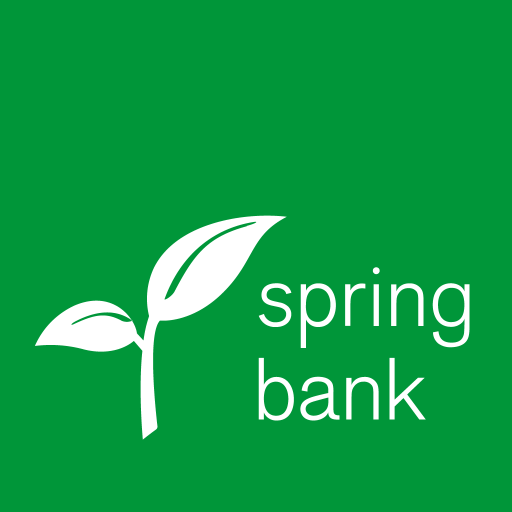
- CERTIFICATION: B-Corp and CDFI
- PERKS: competitive rates, no fees
- AVAILABILITY: New York and online
Spring Bank was the first bank in New York to get certified by B-Corp. It also contributes to the Community Development Financial Institution Fund, a fund that helps get finance to social enterprises, businesses, and people who can’t get the financing they need from banks.
Additionally, Spring Bank supports causes to improve the situation of low-income communities and foster the growth of small local businesses.
It has a handful of branch locations in New York (Bronx, Harlem, Broadway, Astoria, and others). Otherwise, you can open an account online.
Spring Bank has excellent customer service, and it offers high-yield savings accounts, personal and business checking accounts, and personal, small business, and commercial loans.
In addition, the bank has several fee-free options, and you can withdraw for free at CitiBank’s ATMs or using the MoneyPass ATM network.
7. Mascoma Bank 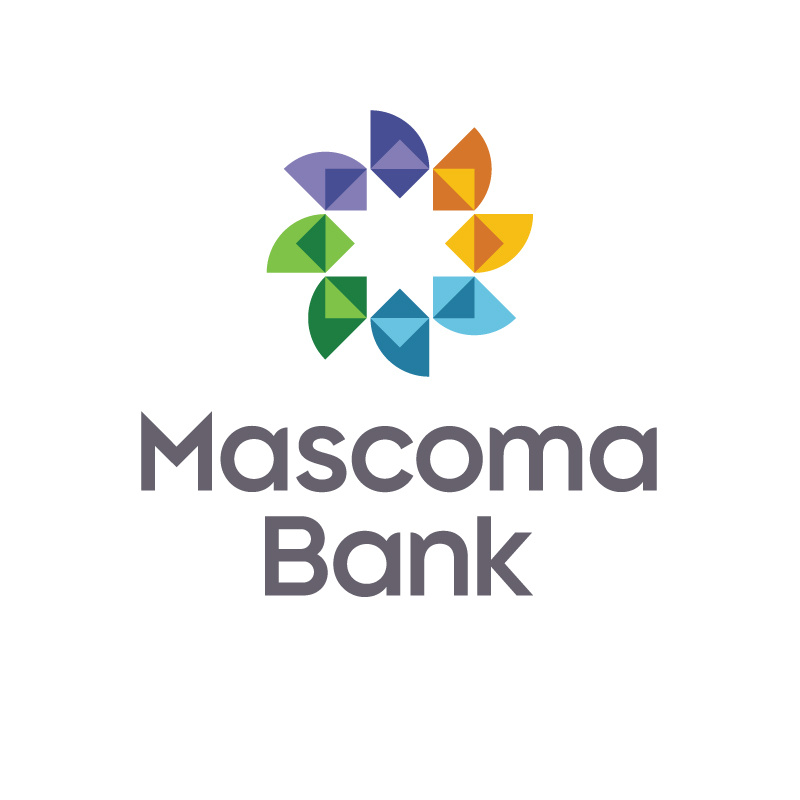
- CERTIFICATION: B-Corp
- PERKS: a variety of accounts, loans, mortgages, good customer support
- AVAILABILITY: Northeast U.S.
Mascoma Bank is a certified B-Corp, committed to helping the environment with its solar and energy-efficient loan programs.
Mascoma Bank also strives to improve society by donating money to philanthropies every year. Along those lines, the bank gives its employees paid time off for volunteering.
In 2023, half of the bank’s external board consisted of women, as did 100% of its executive committee, earning it a spot on Bank Director’s Top 25 Boards for Women.
Mascoma is a full-service bank, well known mainly as a lender for mortgages, personal loans, and business loans. But it also has several personal bank accounts, including checking, savings, and CD accounts.
Mascoma is an excellent bank if you live in New Hampshire, Vermont, or Maine, not only because of its corporate social responsibility efforts but also because of the variety of banking products it offers.
8. Sunrise Banks 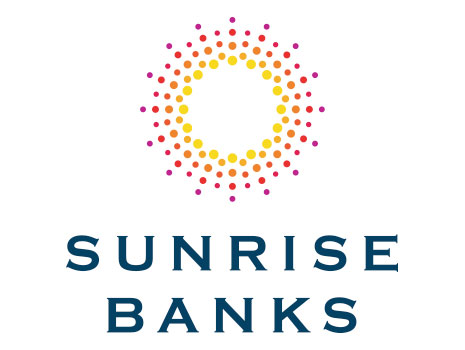
- CERTIFICATION: CDFI, B-Corp, GABV
- PERKS: cash management, variety of products, savings for children
- AVAILABILITY: Minnesota
Sunrise Banks is a Community Development Financial Institution serving Minneapolis and St. Paul since 1986.
It markets itself as “the world’s most socially responsible bank” and checks all the boxes, maintaining CDFI, B Corp, and GABV status. The bank is transparent about its social efforts, releasing an annual impact report each year.
It donates 2% of its net income each year to support affordable housing, narrow the achievement gap, and increase diversity and inclusion through corporate donations and sponsorships.
Sunrise Banks also provides its team members with 40 hours of PTO for volunteer work and hosts annual charitable initiatives benefiting its local communities.
It offers many financial products and services like credit cards, checking accounts, savings accounts, and treasury management solutions to help you keep an eye on your cash flow.
Learn More at SunriseBanks.com
9. U.S. Bank 
- CERTIFICATION: Outstanding CRA rating
- PERKS: competitive bonuses, account variety
- AVAILABILITY: 25+ states, online
U.S. Bank is among the largest banks in the nation, with a reported $681 billion of assets at the end of Q2 in June 2023. Although it doesn’t hold all of the same certifications as some of the online and community banks and credit unions featured, its social and investing initiatives warrant a spot on the list.
While it isn’t CDFI-certified, the bank provides grants to CDFIs to expand their reach to impact communities. And in 2022, the bank invested $2.7 billion in renewable energy tax equity.
Additionally, the company donated or granted $64 million last year and raised its minimum hourly rate for employees to $20.
What’s more, it earned a rating of “Outstanding” in the most recent Community Reinvestment Act Certification (CRA) conducted by the Comptroller of the Currency and was ranked as one of the World’s Most Socially Responsible Banks by Newsweek.
In terms of its products, U.S. Bank has a wealth of checking and savings accounts, CDs, MMAs, credit cards, and business bank accounts. There are also several competitive U.S. Bank promotions for new accounts. The bank has branches in over 25 states, and you can open an account online nationwide.
What Are Socially Responsible Banks?
When you think about big banks or other financial institutions, the environment, social causes, or socially responsible investing probably aren’t the first things that come to mind.
However, some financial institutions rally behind social causes and ethical practices and have a certification to prove it.
Here are the most common certifications and memberships for banks to prove they aren’t spending your money questionably but are investing responsibly:
1. B Corporation
To be B Corp Certified, a bank or another business must make a real effort to balance profit and purpose.
B Corp usually certifies banks that help the social economy, reduce inequality and poverty in some way, and support sustainability and a healthier environment.
B Corp aims to help nonprofits and governments’ efforts by encouraging businesses to use their money and power for good causes.
2. Global Alliance for Banking on Values (GABV)
GABV is an independent network of banks working towards the same goals: using their finances to improve social, environmental, and other worthy causes.
They all work towards more transparent banking practices while supporting social, economic, and environmental efforts.
The network is comprised of more than 70 financial institutions, and it is continuously expanding internationally.
3. Community Development Financial Institution (CDFI)
The CDFI fund is mainly used to give disadvantaged communities the same opportunities others have – like reducing inequality by getting more capital into neighborhoods lacking access to financing.
The fund is composed of both private businesses and federal capital. Any financial institution can apply to be a member of CDFI, and when approved, start contributing to the cause.
World’s Most Responsible Banks
If you’re interested in working with a large global bank, Newsweek’s list of the World’s Most Socially Responsible Banks is a valuable resource.
The annual publication examines 750 banks worldwide, incorporating survey data from 45,000 banking customers.
It then scores the top 175 socially responsible banks based on their environmental concerns, social concerns, and corporate governance concerns.
Our Methodology
To compile our list of the best socially responsible banks, we thoroughly reviewed dozens of banks, neobanks, and credit unions.
We used several metrics to gauge their commitment to ethical banking, including B Corp certification, GABV membership, and CDFI status. We also examined their community engagement, charitable initiatives, and missions.
Additionally, we considered the variety of accounts and features offered by each institution and prioritized banks and credit unions with nationwide availability.





Comments are closed.
Comments are closed here.